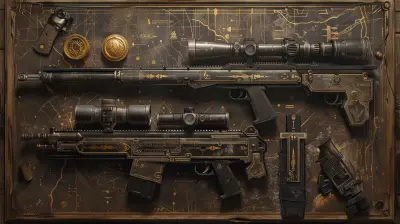12 December 2024
When was the last time you truly bonded with someone over a game? No, I’m not talking about cutthroat battles on a Monopoly board or epic “controller throwing” Call of Duty matches. I’m talking about cooperative games – the ones where you and your teammates work together to tackle challenges, develop strategies, and, most importantly, foster trust and leadership skills. Trust me, cooperative games aren’t just a fun way to spend a weekend; they’re also a sneaky (but awesome) way to build stronger connections while sharpening life skills.
In this article, we’ll dive into the enchanting world of cooperative games. We’ll explore how these games can teach leadership and trust, highlight some of the best titles to get you started, and discuss why every gaming session isn’t just play but preparation for life itself. Ready to level up your social skills? Let’s dive in!
Why Cooperative Games Matter
Think about this: life isn’t a solo campaign. Whether you’re working on a project at your job, navigating family dynamics, or tackling group assignments, the ability to trust and lead others is crucial. That’s exactly the kind of skillset cooperative games can help you develop. Here’s why they’re such a big deal:1. Teamwork Makes the Dream Work
Cooperative games are built around collaboration. You can’t win unless everyone contributes, and there’s no room for lone wolves. This means you’re constantly communicating, strategizing, and supporting one another. That kind of teamwork translates seamlessly into real-life situations.
2. Leadership in Action
Ever noticed how some people naturally step up to lead a group, while others take a backseat? Cooperative games push you to find your role within a team. Whether you’re calling the shots or ensuring everyone’s voice is heard, these games nurture the kind of leadership that’s inclusive and effective.
3. Trust is the Core Mechanic
You can’t fake trust in a cooperative game. If your teammate says they’ll cover your flank or manage the resources, you’ve got to believe them. Fail to trust one another, and your mission can go south fast. Over time, these games train you to have faith in others and develop a deeper connection with your peers.
How Cooperative Games Teach Leadership and Trust
Alright, let’s break it down a little further. How exactly do these games sneakily teach you to become a better leader and build trust? Here’s a closer look:1. Communication is Key
Imagine you’re playing a game where everyone has a piece of the puzzle, but no one sees the full picture. What’s the only way to solve it? Yep, talking it out. Cooperative games demand clear communication. Whether you’re formulating a battle plan or debating the next move, you’re actively practicing the art of effective communication.Suddenly, when you're back at work or in a social setting, you’ll realize how much easier it is to articulate your ideas and listen to others. Boom – skill unlocked.
2. Handling Pressure and Making Decisions
Sometimes, tensions are high, and the clock is ticking. Sound familiar? Cooperative games put you in high-stakes, fast-paced situations where you have to make decisions under pressure. Maybe you’re dividing responsibilities to defend your spaceship in Galaxy Trucker, or perhaps you’re defusing a bomb in Keep Talking and Nobody Explodes. The ability to keep calm and make smart choices? That’s leadership 101.3. Learning to Trust Others
Trust is like a muscle – the more you use it, the stronger it gets. In cooperative games, you often depend on others to fulfill their roles. It’s a risky lesson but an effective one. Once you’ve experienced that “aha!” moment where everything clicks and the team works like a well-oiled machine, it’s a feeling you’ll want to replicate both in and outside the game.
Must-Try Cooperative Games to Build Leadership and Trust
Ready to put these ideas into practice? Here’s a list of some of the best cooperative games out there. From board games to video games, there’s something for everyone. Get your team together and give these a try:1. Pandemic
If saving the world from global outbreaks doesn’t scream “team effort,” I’m not sure what does. In Pandemic, players assume different roles – like the medic or researcher – and work together to stop the spread of deadly diseases. It’s the ultimate test of strategic planning, teamwork, and trust.2. Overcooked!
Ever tried running a kitchen with your friends in a chaotic, fast-paced environment? Overcooked! is not only hilarious but also an excellent way to practice communication and problem-solving. Trust me, keeping your “culinary empire” afloat requires serious teamwork.3. Spirit Island
In Spirit Island, you and your friends play as gods who must protect your island from colonial invaders. This game is all about synergy – understanding how each player's abilities can complement the others and working together as a cohesive unit.4. Among Us
Okay, hear me out – I know Among Us can breed distrust, but when played with an honest crew, it’s a great exercise in communicating clearly, delegating tasks, and observing behavior. Plus, it’s a fantastic way to strengthen your ability to spot leaders (or impostors!) in the real world.5. It Takes Two
This two-player action-adventure game revolves around cooperation, communication, and trust. You and a partner tackle various puzzles and challenges, each requiring the unique skills and abilities of both players. It’s perfect for honing mutual understanding and shared problem-solving.
The Life Lessons in Cooperative Games
One thing people often overlook about games is how deeply they reflect life. When you play cooperative games, you’re essentially practicing for real-world situations. Think of it this way: life throws challenges at you (big bosses, if you will), and you need a team you can rely on to help you tackle them.Leadership, trust, communication, and problem-solving – these are things we all need to thrive. Sure, you might pick these up in more formal settings like seminars or training programs, but why not learn them while having a blast with friends or family? It’s like sneaking vegetables into a tasty dish – you’re learning without even realizing it.
Pro Tips for Getting the Most Out of Cooperative Games
Want to make sure your next game night is not only fun but also a skills-building session? Here are some quick tips:1. Switch Leaders
Rotate leadership roles so everyone gets a chance to step up and lead the team. This gives everyone the chance to flex their leadership muscles.
2. Debrief After Every Game
Take five minutes post-game to discuss what went well and what could’ve been better. It’s a great way to reflect on lessons learned.
3. Play with Different Groups
Challenge yourself by playing with people who have different personalities and playstyles. It’ll push you to adapt and improve your communication skills.
4. Keep the Fun Alive
Remember, it’s still a game! Don’t get so caught up in the learning aspect that you forget to enjoy it.
Final Thoughts
Cooperative games are more than just a source of entertainment; they’re a powerful tool to help strengthen relationships, build leadership qualities, and foster trust. Whether you’re saving the world in Pandemic, running a chaotic kitchen in Overcooked!, or solving puzzles in It Takes Two, every session leaves you better equipped to handle life’s challenges.So, gather your friends, dust off your favorite co-op game, and let the bonding (and learning) begin. Who knows? You might just discover you’re a born leader – or at least a very trustworthy teammate.










Ainsley Duke
Who knew that bonding over pixelated chaos could prepare us for real-life trust falls? Forget ropes and trust exercises — just hand me a controller and let’s see if I can lead my teammates to victory without accidentally launching them into lava. It’s all about the friendship... and winning!
February 3, 2025 at 5:27 AM